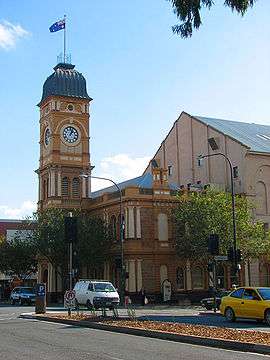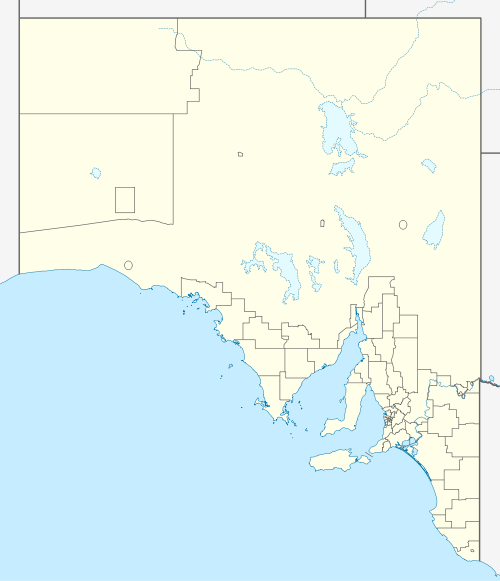City of Kensington and Norwood
The City of Kensington and Norwood, originally the Corporate Town of Kensington and Norwood, was a local government area in South Australia from 1853 to 1997, centred on the inner eastern Adelaide suburbs of Kensington and Norwood. In November 1997 it amalgamated with the City of Payneham and the Town of St Peters to form the City of Norwood Payneham & St Peters.
| City of Kensington and Norwood South Australia | |||||||||||||||
|---|---|---|---|---|---|---|---|---|---|---|---|---|---|---|---|
 Norwood Town Hall, formerly the council headquarters | |||||||||||||||
 City of Kensington and Norwood | |||||||||||||||
| Coordinates | 34.920940°S 138.636433°E | ||||||||||||||
| Established | 1853 | ||||||||||||||
| Abolished | 1997 | ||||||||||||||
| Area | 3.92 km2 (1.5 sq mi)[1][2] | ||||||||||||||
| Council seat | Norwood | ||||||||||||||
| |||||||||||||||
History
It was proclaimed on 7 July 1853 as the Corporate Town of Kensington and Norwood, covering the then villages of Kensington, Norwood and Marryatville. The town extent was defined as sections 260, 261, 276, 277, 289, and 290 of the Hundred of Adelaide, corresponding to land beside First Creek and Second Creek enclosed by the modern suburbs of Norwood, Marryatville, Kensington and Heathpool. It was the first municipal corporation in South Australia after the City of Adelaide.[2]
The council was divided into three wards at its inception: West Norwood, East Norwood and Kensington.[3] Charles Bonney was unanimously elected as the first mayor.[2]
On 18 September 1856, it gained Kent Town from the District Council of Burnside, which was then incorporated as Kent Ward.[4] This was the only change ever made to the council's boundaries.[2] These boundaries were defined as Dequetteville Terrace, Kensington Road, Portrush Road, the southern and eastern boundaries of section 290, Shipster's Road, East Parade, Kensington Terrace, Magill Road and North Terrace.[1] In 1878, the municipality had a population of 6500, which had doubled by the mid-1880s.[2]
The original Kensington and Norwood Town Hall was built in 1859 and demolished in 1897. The present Norwood Town Hall was opened in 1883, and received extensive additions in 1914.[5][1] The council undertook a significant program of tree planting in its early years, and managed three municipal plantations.[1] In 1905, the council was given Norwood Oval as a gift in trust, and managed it thereafter.[2]
It was granted city status on 7 July 1953, the date of its centenary, becoming the City of Kensington and Norwood. The council elected its first woman member, Pamela Meade, in 1975. In 1977, it adopted a general policy "to preserve the historic character of the City", and undertook a heritage survey in 1980; in the mid-1980s it was reported to have "the greatest density of heritage buildings [per hectare] recognised by heritage authorities in the state".[2]
In 1985, it was responsible for an area of 3.92 square kilometres, with a population of approximately 9,500, having declined from a peak of 17,000 in the mid-1950s. It had a budget of only $3 million in that year. Each of the four wards was represented by two councillors, with four aldermen representing the whole council area and a directly-elected mayor. 23% of the population was over the age of 65 – the second-highest in metropolitan Adelaide. The council sponsored the Christmas Pageant and Mardi Gras each November, the second-largest in South Australia. It also operated a swimming pool complex and a caravan park.[2]
The council had been deemed to be too small for economic survival as early as the 1970s, and on 1 November 1997 it amalgamated with the City of Payneham and the Town of St Peters to form the City of Norwood Payneham & St Peters.[6][2]
Mayors of Kensington and Norwood
- Charles Bonney (1853)[2]
- William Buik (1866–1867)
- Edwin Thomas Smith (1867–1870, 1871–1873)
- Samuel Dening Glyde (1875–1878)
- David Packham (1878–1879) [7]
- Thomas Caterer (1882)[1]
- Thomas Gepp, jun. (1888–1890)[8]
- James Hall (1890–1892)[9]
- Thomas White (1892–1895)[10]
- Robert. K. Threlfall (1895–1897)[11]
- Alfred Binks (1897–1899)[12]
- William Story (1901–1903)[13][14]
- H. J. Holden (1903–1907)
- George Henry Prosser (1907–1912)
- H. J. Holden (1912–1916)
- William Speakman Hanson (1930–1937)[2]
- Albert William George Martens (1939–1942)[2]
- William Essery Jr. (1942–1946)[2]
- Roy Moir (1946–1951)[2]
- Frank William Nelson White (1951–1958)[2]
- Frederick John McCallum (1958–1963)[2]
- Jeffery Humphris Cashmore (1963–1967)[2]
- Reginald Nurse (1967–1971)[2]
- John Douglas Richards (1971–1980)[2]
- Raymond Gabriel Rolland (1980–1981)[2]
- Brian Polomka (1981–1982)[2]
- John Douglas Richards (1982–1985)[2]
- Vini Ciccarello (1991–1997)[15]
Other notable figures
- George Ernest Hamilton – inaugural councillor
- Lionel Hill – councillor in the late 1950s
- C. Harrie Gooden – assistant town clerk and valuator
- George Searcy – auditor for 37 years
See also
References
- Hosking, P. (1936). The Official civic record of South Australia : centenary year, 1936. Adelaide: Universal Publicity Company. p. 286.
- Matthews, Penny (1986), South Australia, the civic record, 1836-1986, Wakefield Press, pp. 250–255, ISBN 978-0-949268-82-2
- "Thursday, July 7, 1853" (PDF). South Australian Government Gazette. Government of South Australia. Retrieved 13 December 2016.
[...] the boundaries of the said Town shall be—on the west, the eastern side of preliminary section 255 and the western side of preliminary section 290; on the north, the northern sides of preliminary sections 260, 277, and 289; on the east, the western side of preliminary sections 288, 300, and 299; on the south, the southern sides of preliminary sections 261,276, and 290 [...]
- "Thursday, September 18, 1856" (PDF). South Australian Government Gazette. Government of South Australia. Retrieved 13 December 2016.
- "Summary of State Heritage Place" (PDF). South Australian Heritage Council. Retrieved 13 December 2016.
- "Thursday, 24 April 1997" (PDF). The Government Gazette of South Australia. Government of South Australia. Retrieved 12 December 2016.
- "OBITUARY". The Chronicle. LIV (2, 799). South Australia. 13 April 1912. p. 44. Retrieved 13 December 2016 – via National Library of Australia.
- "Adelaide's Police Magistrate". The Register (Adelaide). LXXXI (21, 779). South Australia. 28 August 1916. p. 5. Retrieved 10 February 2019 – via National Library of Australia.
- "Mr. James Hall". The Advertiser (Adelaide). South Australia. 23 September 1947. p. 4. Retrieved 10 February 2019 – via National Library of Australia.
- "Death of Mr T. White". The Advertiser (Adelaide). XLIV (13, 472). South Australia. 21 December 1901. p. 10. Retrieved 10 February 2019 – via National Library of Australia.
- "Personal". The Advertiser (Adelaide). LIX (18, 067). South Australia. 8 September 1916. p. 6. Retrieved 10 February 2019 – via National Library of Australia.
- "The Late Cr. A. Binks". Evening Journal (Adelaide). XLIV (12095). South Australia. 6 January 1910. p. 2. Retrieved 10 February 2019 – via National Library of Australia.
- "The Border Watch". The Border Watch. XXXVI (8955). South Australia. 4 December 1901. p. 2. Retrieved 13 December 2016 – via National Library of Australia.
- "KENSINGTON AND NORWOOD". The Chronicle. 46 (2, 363). South Australia. 5 December 1903. p. 32. Retrieved 13 December 2016 – via National Library of Australia.
- "Libraries Board of South Australia" (PDF). State Library of South Australia. Retrieved 13 December 2016.